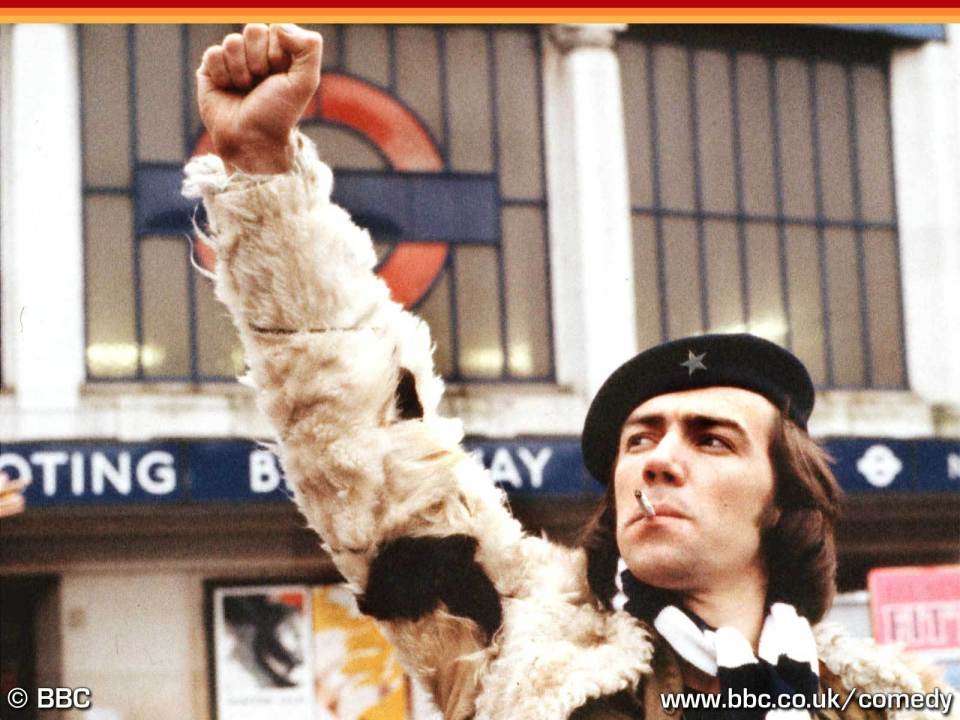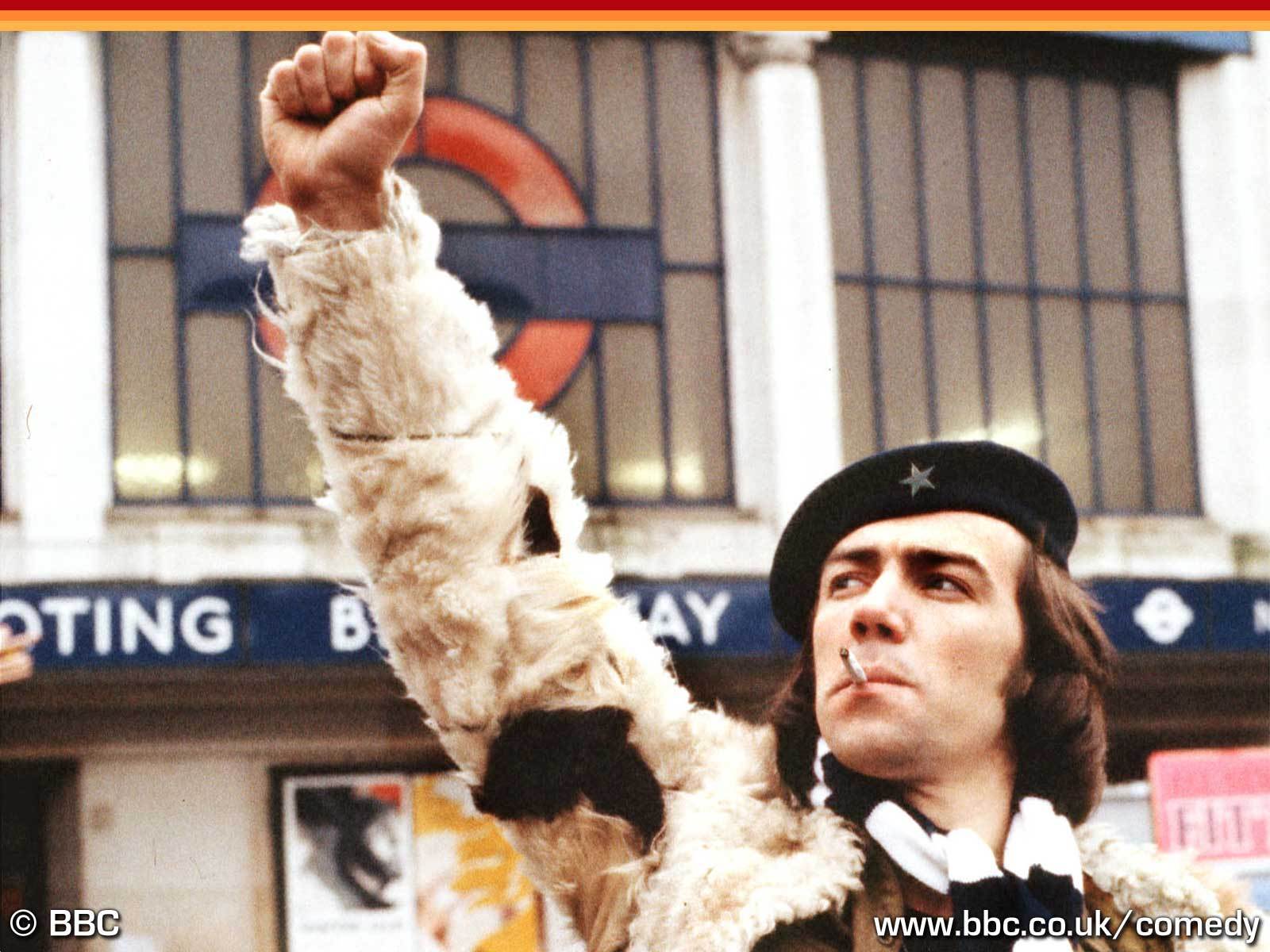 Why Tooting Broadway? Of all the places in London, why would David Cameron choose this decaying corner of South London to launch his new agenda? It is in the public memory thanks to the opening credits of Citizen Smith, where Wolfie Smith started out shouting “power to the people”. And just a few yards away, the man introduced by Francis Maude as “Britain’s next elected Prime Minister” stood to give us his thoughts.
Why Tooting Broadway? Of all the places in London, why would David Cameron choose this decaying corner of South London to launch his new agenda? It is in the public memory thanks to the opening credits of Citizen Smith, where Wolfie Smith started out shouting “power to the people”. And just a few yards away, the man introduced by Francis Maude as “Britain’s next elected Prime Minister” stood to give us his thoughts.
Inside the hall (from where I am blogging), almost everyone is white. Outside, almost no one is. I was actually approached in the street when I walked past, by an usher who reasonably deduced that white people in suits were lost journalists. If anything, Tooting Broadway seems less mixed than when I lived in one of its grottier estates ten years ago.
Anyway, the more the Conservatives talk about ethnic diversity, the more their own lack of it sticks out. Even the “locals” they choose don’t quite work. There were several warm-up acts, including someone apparently raised by a single mother in Tooting – although, like so many “local” Tory candidates, he spoke like a subaltern. “We need to be the change that David talks about” he said. The next speaker took this further. “It’s not enough for us to represent a community. We have to be that community,” he said. Eh? “We start to become the natural party of social responsibility… As I look around this room, I see people who genuinely get this stuff.”
In the hall, perhaps, but not outside. Cameron has chosen “social responsibility” as his rallying cry, and I have been told that if he repeats this rather nebulous phrase enough, it will mean something in the public mind. I have my doubts. Steve Hilton built a successful business selling this idea to the corporate sector (see his book) but can it really work as a political creed? In effect, this is what the speech was about.
Back in January, I described social responsibility as “a bad name for a good idea.” Now I think it’s 40% brilliant, 30% dismal and the rest is too vague to diagnose. Here are the highlights.
1. Attacks Brown as a statist: “That’s the big difference between us and Gordon Brown. His answer to crime, his answer to education, his answer to everything – is a top-down government scheme” He’s precisely right, Brown won’t shift from this analysis. It’s a powerful divide in politics, and the Conservatives are wise to be on this side of it. 2. Social Responsibility is too vague: “I understand what state control is, but social responsibility” asked someone in the audience. Cameron’s definition was, asking “how can we make everyone take their responsibilities?” The chap looked just as confused afterwards as he had been before. 3. Mismatch between education and health policy: “Parents know best what works for their kids. Doctors and nurses know best how to improve the NHS and give patients great healthcare.” Notice the crucial divide. Parents know best, but patients apparently don’t. The Conservatives intend to pass power not to the users of the health service, but to the NHS establishment. This sticks out like a sore thumb from the rest of his policies: “power to the people, as long as they’re not in a doctor’s waiting room?” This has to change. 4. “A grammar stream in every subject in every school”: Michael Crick from Newsnight hit on another contradiction. How can Cameron devolve power to schools, set them free from bureaucracy, and then dictate how they should teach? Streaming works in some schools, less in others. “We cannot in Whitehall write the prospectus for every school, nor should we” replied Cameron. In this case, he should stop sounding off how English teachers should do their jobs. Cameron has a potentially revolutionary policy, as I argued a fortnight ago, but alas he said nothing about it today. 5. The family: Cameron again vigorously defended the family – a cause that “matters to me more than any other”. This is another powerful dividing line, as Peter Oborne brilliantly argued in the Daily Mail on Saturday, and it’s encouraging to see the Conservatives are keeping up the pressure. Problem is that he’s building up expectations. I’m told the Tories will have almost no budget to offer families anything meaningful at the next election. This will have to change. 6. Coalition: “We’ve remembered the importance of rebuilding that broad Conservative coalition” Well, that’s a relief. I hope this means there will also be a place in the party for those who believe in grammar schools and tax cuts. I noticed Cameron said “economic stability before up-front tax cuts” but they explicitly said he’d deliver tax cuts in government. A welcome change of emphasis. 7. “We are a 40% party once again”: Sadly, this ain’t so. Labour’s rising in the polls, and the Conservatives being on 40% seems to have been an isolated incident back in March. 8. Britishness: He offered an alternative vision to Brown – but his definition means “not bullying people with instructions to integrate” apparently. I’m rather a fan of both immigrants and encouraging them to integrate. If this is to be a dividing line, then Brown is on the right side of it. 9. Optimism: “I am a determined optimist” he said. Another powerful agenda – as ConservativeHome pointed out almost two years ago. Brown wants to scare folk into thinking the world is a nasty place with Chinese workers coming for our jobs, thereby encouraging them to choose a strong man at election time. It is great that the Tories choose a different stance. They know how hard it is for Brown to smile. 10. Disowning Blair: Cameron said he’s “not copying New Labour, but learning from its mistakes.” Not quite true, I think. He’s learnt plenty from Labour’s successes, but has realised his party hate to hear him say so. Expect more distancing from Blair from now on.
So, as ever, a speech where cause for encouragement is richly mixed with reason for dismay. But on the whole, a step forward.
PS Where was David Davis? He was raised by a single mother in a Tooting council estate and doesn’t speak like he was then adopted by minor nobility.







Comments